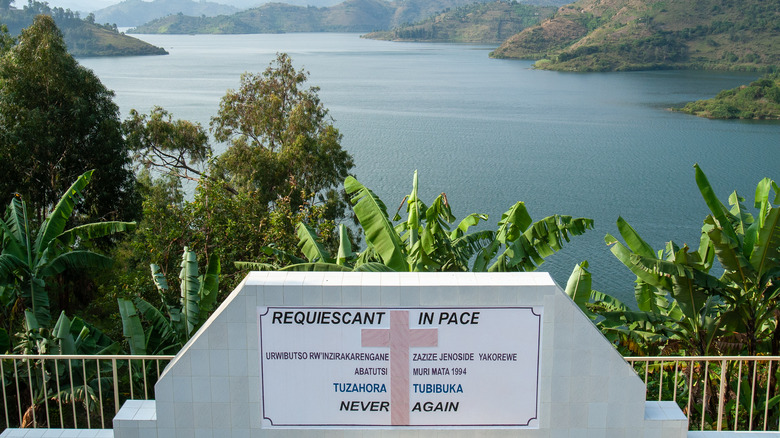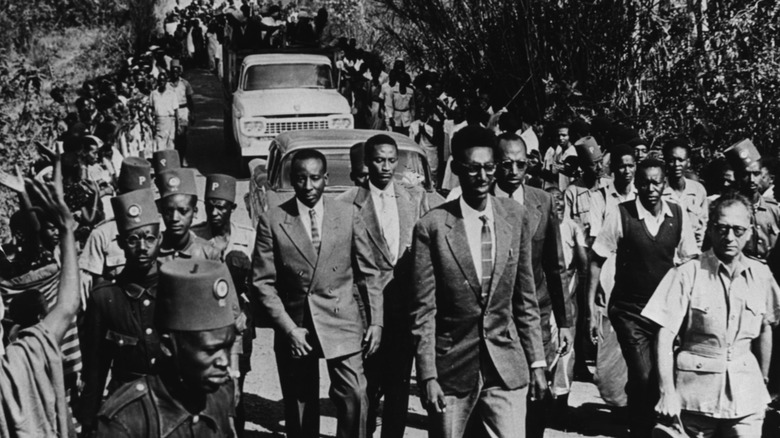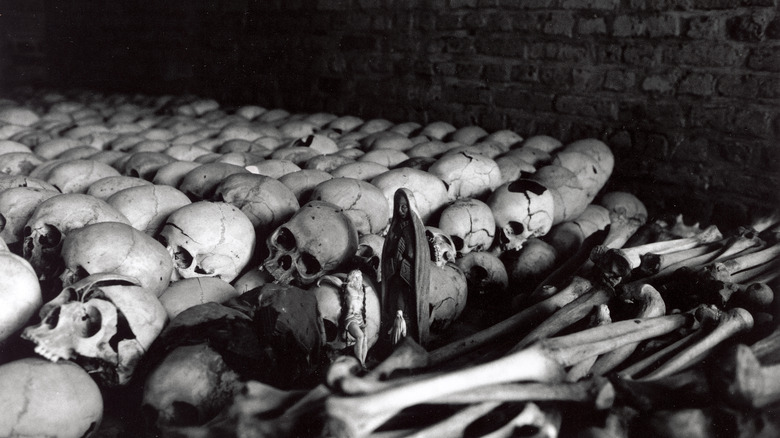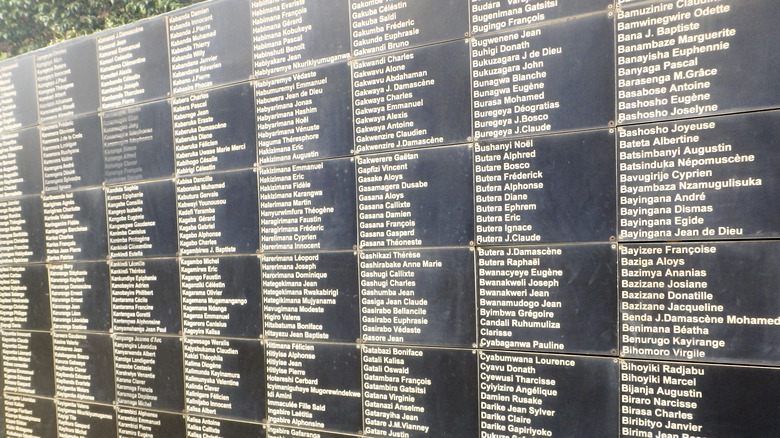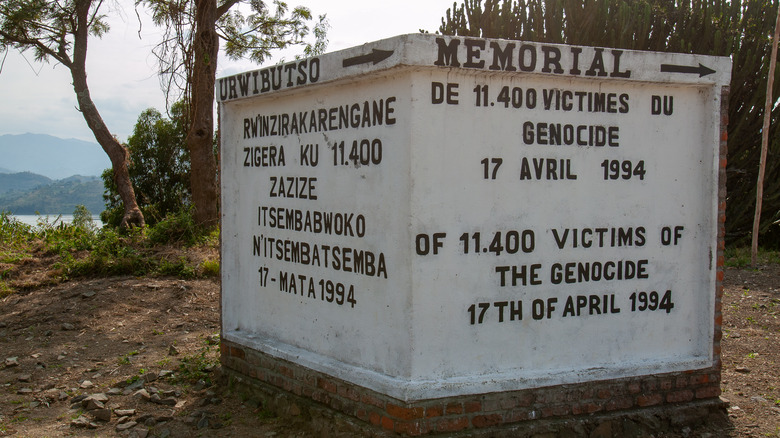How The Rwandan Genocide Influenced Its Easter Celebrations
Easter is celebrated every year by members of the Christian faith in all corners of the world. This includes those in the African nation of Rwanda, where an estimated 90% of the population identifies as Christian (via WorldAtlas). The holiday also happens to fall around the anniversary of a dark moment in the nation's history, which is thought to have affected Easter celebrations in Rwanda (via The New Times).
In the mid-1990s, an estimated 800,000 people were killed by Hutus, the ruling ethnic group at the time. According to History, most of those killed were Tutsis, an ethnic minority. In the years since the Rwandan genocide, a lot has changed, including the ways the nation celebrates Easter. The reason for this is open for debate. While some claim it has to do with modern sensibilities and people preferring to do other things on holidays, others have argued that the decline in Easter celebrations is directly related to the genocide.
Before the Rwandan genocide
After World War I, Rwanda — which had previously been part of German East Africa — was put under Belgian control. As was the case in the 1990s, the Tutsis were a minority ethnic group, while the Hutus made up the majority of the country. However, according to History, the Belgians had a preference for the Tutsis, which was enough for them to gain control of Rwanda for decades.
According to the BBC, in 1959, the Hutus took over the country and switched the government from a Tutsi-led monarchy to a Hutu-led republic. A few years later, Rwanda was given independence from Belgium, and eventually, the nation elected Major General Juvenal Habyarimana as president in 1973. He stayed in power for the next two decades, but the entire time, animosity between the two groups was boiling.
In the early '90s, some Tutsis formed a Rwandan Patriotic Front, or RPF, and attempted to overthrow the government. Many of those in the RPF had previously been exiled from Rwanda, so they entered their home country from neighboring Uganda. This led to three years of conflict, which ended with a 1993 peace deal that included the provision that a new government would be created with RPF input.
The start of the Rwandan genocide
In 1994, one year after the peace agreement to end the fighting between the Rwandan government and the Rwandan Patriotic Front, Juvenal Habyarimana was on a plane with Cyprien Ntaryamira, the president of Burundi. As their plane was flying over the Rwandan capital city of Kigali, it was shot down, killing everyone on board, including both presidents (via History).
There has never been a conclusive answer for who or what was responsible for bringing down Habyarimana's plane, but some Hutus immediately blamed the RPF. Seeing as the RPF was a Tutsi organizaition, the Hutus used it as an excuse to mount a genocidal campaign against their long-time opposition. According to the BBC, government-issued IDs listed a person's ethnic group. Hutu extremists set up roadblocks and required those passing through to present their IDs; those who were Tutsi were killed. Even Hutus who held moderate views were killed.
Killing squads were given lists of political opponents and went about killing them. There were even reports of Hutu men killing their Tutsi wives. In addition to the killings, thousands of women were abducted and sold into sex slavery.
The aftermath of the Rwandan Genocide
The Rwandan genocide unfolded with shocking speed. It only lasted around 100 days but left hundreds of thousands dead. One way this was done was by giving lists of targets to groups at the local level who knew where they could find the people on their lists (per BBC).
Despite the mass killings, the Rwandan Patriotic Front had the backing of the Ugandan government, which allowed them to take over Kigali. This caused millions of Hutus to flee over concerns that the new powers that be would launch their own series of revenge killings. In a way, that happened, because the RPF backed rebel groups in Zaire — where many of the Hutus fled — and helped them take over the country, renaming it the Democratic Republic of Congo. Ensuing wars in that country included as many as six neighboring nations and led to 5 million deaths.
Easter in Rwanda
Easter celebrations in Rwanda don't seem to be what they once were. One woman in her 70s told The New Times that before the genocide in 1994, families would get together and learn songs about Jesus' resurrection and buy new outfits to wear as a sign of their happiness. Some speculate that this could just be a byproduct of changing sensibilities in modern times. One man who spoke with The New Times said that a lot of families seem to want to do other things rather than get together for the holiday.
There's another explanation still, but this one is much, much darker. According to the BBC, during the genocide, even priests and nuns were known to have committed murders. Some of those victims were in the church as a way of finding shelter and escaping the killings. "People had faith in their religion," Reverend Nathan Gasatura says. "It is a shame that some churches and religious leaders that were supposed to protect people ended up participating in the mass killings instead. It completely changed everything. Many people switched religions after that."
Some argue that Easter should be celebrated because of its theme of rebirth
One argument that has been made is that Easter should be embraced by Rwandans because of its themes of rebirth. Of course, as most know, the holiday celebrates the resurrection of Jesus Christ. Some, like Joseph Rwagatare, have said that the biblical account of Jesus' crucifixion in some ways mirrors Rwanda's over the last few decades. "It is remarkable how the recent history of Rwanda mirrors the events of the Easter period," Rwagatare wrote in an opinion piece for The New Times. "It falls roughly during the time the Genocide against the Tutsi was committed in 1994, a time when the nation died but also resurrected."
"Easter is also a celebration of an actual historical event and its connection to another one in the history of this country should deepen our spiritual life, enrich our relations with one another, and hold supreme the value we attach to human life," he concluded.
